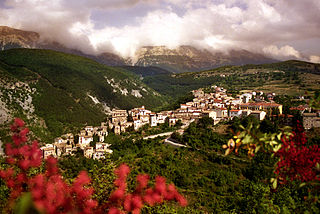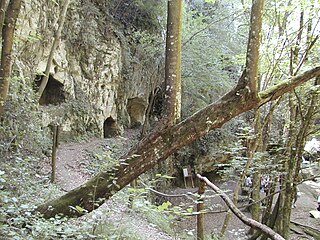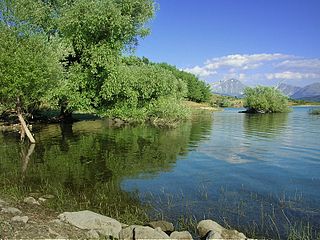
The province of L'Aquila is the largest, most mountainous and least densely populated province of the Abruzzo region of Italy. It comprises about half the landmass of Abruzzo and occupies the western part of the region. It has borders with the provinces of Teramo to the north, Pescara and Chieti to the east, Isernia to the south and Frosinone, Rome and Rieti to the west. Its capital is the city of L'Aquila.

Pacentro is a comune of 1,279 inhabitants of the province of L'Aquila in Abruzzo, Italy. It is a well-preserved historic medieval village located in central Italy, several kilometers from the City of Sulmona about 170 kilometres (110 mi) east of Rome. It is one of I Borghi più belli d'Italia.
Palena is a comune and town in the province of Chieti in the Abruzzo region of Italy.

Campo di Giove is a town and comune in the province of L'Aquila in the Abruzzo region of central Italy. Its territory is included in the Majella National Park. Located at the foot of the southwestern slope of the Majella, it is a holiday resort in summer and winter, thanks to the presence of a ski station. In English, its name means 'Campus Jovis'.

Cansano is a comune in the province of L'Aquila in the Abruzzo region, Southern Italy. It is part of the Maiella National Park. Cansano is known for the archaeological discovery of the Italic and Roman town of Ocriticum, which has become an archaeological park.

Tourism in Abruzzo has become one of the most prosperous sectors in the economy of Abruzzo, and in recent years has seen a remarkable growth attracting numerous tourists from Italy and Europe. According to statistics, in 2021 arrivals totaled 1,330,887. A total of 5,197,765 arrivals were tourists, a figure that puts the region seventeenth among the Italian regions for numbers of tourists per year. A moderate support to tourism is also given to the Abruzzo Airport with many low cost and charter flights connecting the entire region with the rest of Europe.

Eremo di Sant'Antonio is an hermitage located in Pescocostanzo, Province of L'Aquila.

Eremo di Sant'Angelo is an hermitage located in Lettomanoppello, Province of Pescara.

Eremo di San Bartolomeo in Legio is an hermitage located in Roccamorice, Province of Pescara, in the Abruzzo region of Italy.

Eremo di San Giovanni all'Orfento is an hermitage located in Caramanico Terme, Province of Pescara.

Eremo di Sant'Angelo is an hermitage located in Palombaro, Province of Chieti.

Eremo della Madonna dell'Altare is an hermitage located in Palena, Province of Chieti.

Eremo di San Michele Arcangelo is an hermitage located in Pescocostanzo, Province of L'Aquila.

Eremo di Santo Spirito a Majella is an hermitage located in Roccamorice, Province of Pescara.

Eremo di Sant'Onofrio is an hermitage located in Serramonacesca, Province of Pescara.

Eremo di Sant'Onofrio al Morrone is an hermitage located in Sulmona, Province of L'Aquila ., dating back to the thirteenth century. A monk by the name of Pietro Angelerio living at this hermitage later became Pope Celestine V. The hermitage is located at an altitude of 620 meters, and can only be reached via a steep path from the village of Badia, on the eastern edge of the Valle Peligna.

Tombe rupestri di San Liberatore is a burial place located in Serramonacesca, Province of Pescara.

Complesso rupestre di San Liberatore is a rock-cut architecture located in Serramonacesca, Province of Pescara.

Over the years, Abruzzo has become the most industrialized region of southern Italy and has had significant improvements and growth also at an economic level; the region has reached and surpassed many Italian regions in the specialization of the various industrial sectors and today it is the richest of the regions of Southern Italy.

Mount Porrara is a mountain in the Abruzzi Apennines, located between the lower province of L'Aquila and the province of Chieti, a natural geomorphological continuation south of the Maiella, included in the Maiella National Park.




















